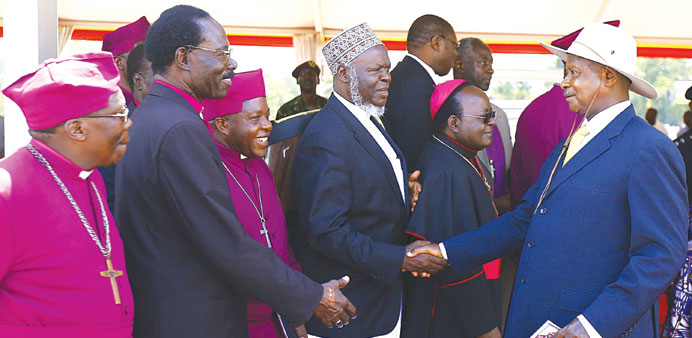Reuters/Kampala
President Yoweri Museveni told a rally yesterday of religious leaders, politicians and thousands of supporters that Uganda could live without aid that Western donors suspended or diverted in protest at an anti-gay bill that became law in February.
Western donors have halted or re-directed about $118mn in aid since Museveni signed the law, which toughened existing rules against gays and prescribed life in jail for what it called “aggravated homosexuality”, such as sex with a minor.
Despite the Western outcry, the thousands who turned out at yesterday’s rally in a square in Kampala underlined public support for the law. Uganda now has of some of the toughest codes, yet it is only one of 37 African nations that outlaw homosexuality.
Museveni may have in part been prompted to back the law to shore up support, analysts say. He is widely expected to seek another presidential term in 2016. He has ruled since 1986.
“When you hear these Europeans saying they are going to cut aid ... we don’t need aid in the first place,” Museveni said. “A country like Uganda is one of the richest on earth.”
Uganda still relies heavily on aid, including some direct support to the budget. But it has lived with aid disruptions before. In 2013, aid flows were cut over a corruption scandal. Growth slipped, but the economy still expanded about 6%.
With an annual per capita income of $440 a year according to the World Bank, Uganda has found commercial quantities of oil. But it remains at least two or three years away from production although initial finds were made in 2006.
Supporters applauded when Museveni declared homosexuality “unhealthy”.
Schoolchildren at the rally raised placards with the word “Sodomy” crossed out. Speeches by religious and political figures also received cheers and applause.
“The Lord has the power to help us Ugandans to overcome the battle against homosexuality,” said Stanley Ntagali, head of Uganda’s Anglican Church, the second biggest Christian group in the east African nation of 36mn people.
The anti-gay bill was initially drawn up in 2009, when it proposed the death penalty for those offences deemed most serious, such as having gay sex when HIV positive.
Museveni sent the bill back to parliament once and Western diplomats said they had received assurances from officials that the government would bury the law.
When he signed, the US called the law “atrocious” and said it would review ties.
The World Bank suspended a loan and nations such as Denmark, Norway and the Netherlands said they were halting or diverting aid away from the government.
Those at the rally brushed off Western attitudes. “If you’re a homosexual you can’t give birth to children,” Steven Kabindi, 30, at the rally. “I am here to show support to our leaders in their fight against this evil.”

Uganda’s President Yoweri Museveni (second right) meets religious leaders in Kampala yesterday.
